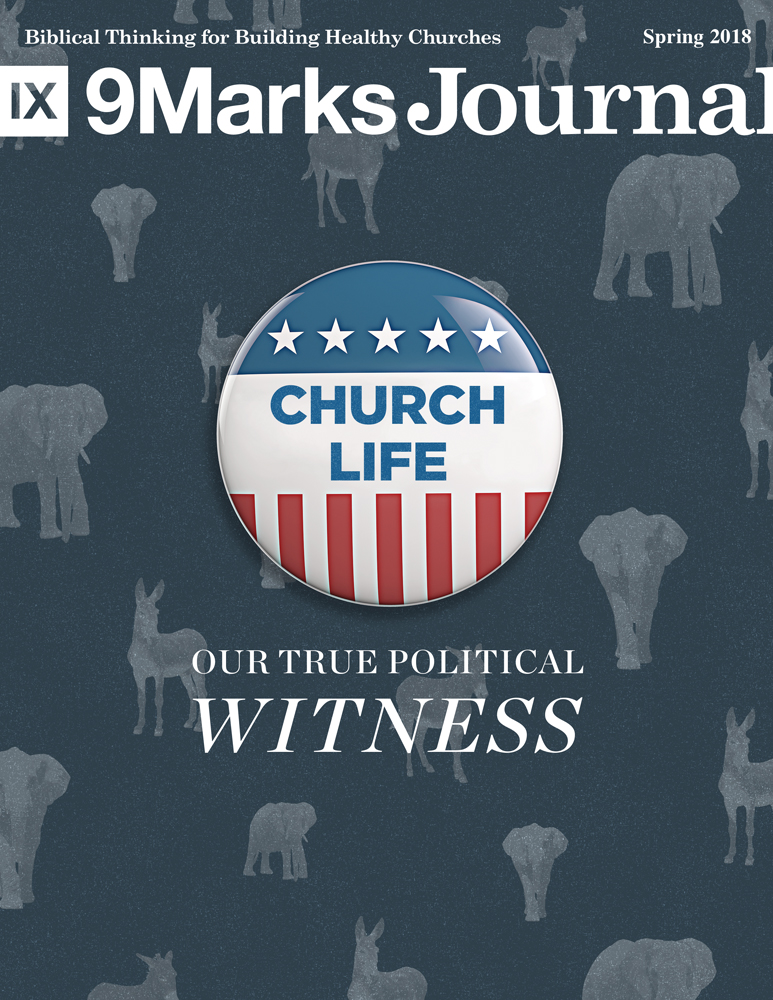
Church Life: Our True Political Witness
Church Life: Our True Political Witness
by Jonathan Leeman
American Civil Religion and the Gospel Aren’t the Same Thing
by John D. Wilsey
The Church’s Most Powerful Political Word: The Gospel
by Jonathan Leeman
The Local Church as a Counterculture
by Brett McCracken
Understanding Our True Citizenship
by Sam Emadi
Churches Should Say Neither Too Little Nor Too Much
by Matthew Arbo
How the State Serves Both Salvation and Religious Freedom
by Jonathan Leeman
A Symposium: How Can We Work Toward Greater Ethnic Unity in Our Churches?
by Irwyn L. Ince, Paul Jeon, Peter Y. Lee, and Phillip Holmes
Why There’s No Such Thing as African Christianity
by Conrad Mbewe
More Christian Than Black or White
by Isaac Adams
More Christian Than American
by J.D. Greear
Men, Women, and the Place of True Equality
by Trillia Newbell
Just a Spoonful of Wilberforce
by Jonathan Worsley
The Dangerous Allure of Being a Cultural Warrior
by Brian Davis
Why Politics Overwhelms the Church
by Russell D. Moore
Editor’s Note:
I don’t need to tell you that America feels as politically and culturally divided as ever. You probably feel it. Outside of churches, Christians feel increasingly pushed to the outskirts of our national public life. Inside of churches, Christians can’t agree over the best way forward or what it means to do justice. A friend from another church emailed me about the arguments his small group was having during the last elections. “It’s dangerous to bring up politics,” he said. It was hurting old relationships. What do we do?
The goal of this 9Marks Journal is to redirect our political gaze from the nation to the church. Our political hope must not be in the next presidential election, or in trying to win the country “back” or “forward” to something different. Believe it or not, the political hope of the nations is in local churches. If churches represent the kingdom of heaven, then we have to say: heaven first touches down on earth through our churches, not through the voting booth or a court’s rulings.
The most powerful political word in this world is the gospel. Abraham Lincoln talked about the need for the United States to “achieve and cherish a just and lasting peace among ourselves and all nations.” Do you know where the world should first witness this just and lasting peace? In the life and fellowship of the boundary-defying local church. It’s in the local church where we first beat our swords into plowshares and spears into pruning hooks. It’s in the church where one-time enemies learn to love one another.
To be sure, Christians should remain involved in the public square for the sake of love and justice. Russell Moore says this in his piece, as do I in the article on the state serving salvation.
Still, our primary political investment must occur in our churches. We cannot talk with integrity about family values if our marriages are falling apart. Or advocate for tax policy changes if we’re not being generous with fellow believers. In short, churches should think less about redeeming the nation and more about living as a redeemed nation.
My two pieces on the church and the gospel cast the basic vision. John Wilsey, J. D. Greear, and Bruce Ashford help to disentangle our Christian identity from other forms of identity that threaten to subvert it, whether national or partisan.
Jonathan Worsley and Brian Davis warn against the allure of being a culture warrior. Brett McCracken and Sam Emadi offer a positive picture of what Christians should be: counter-cultural citizens of heaven. Trillia Newbell provides a very concrete and wonderful picture of how the church should be counter-cultural by affirming the equality of men and women. Matthew Arbo, too, captures the balanced picture of churches that neither say too little nor too much, a balance that seems to elude many Christians conversations about the public square.
Three articles in particular deserve a special highlight. Conrad Mbewe reminds us of how wonderfully global Christianity is, and the fact that we are Christians before anything else, no matter how profound those other things are. Isaac Adams and Whitney Woollard then offer what may be the most prophetic and powerful pieces in the Journal. Adams challenges White Christians, “Are you willing to give up your ethnic identity like you’re asking minorities to give up theirs?” We have resources the world doesn’t.
That, in a sense, is the message of the whole Journal. We have the gospel, which means we have the power to change and to do justice and to love righteousness and to honor the dignity of all humanity. No church does this perfectly, to be sure. But that should be our ambition, because we have the righteousness of Christ and the Spirit of God.
So pastor, what would your members say is more powerful: the nationally televised political speeches given every four years before an election, or the political speech they hear every week from your pulpit, calling them to repentance and faith? I hope they know it’s the latter. Your sermons can change the world far more than any party’s national convention. I hope you’re shepherding their hopes and expectations rightly.
—Jonathan Leeman
Free Download
PDF, ePub, and Kindle files will be sent to this email address. As part of our community, you will receive content & communication from 9Marks. You may unsubscribe at any time.
